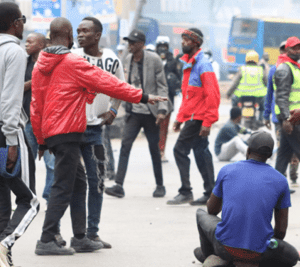By Dr. Charles Tardieu, Ph.D,, Ex Minister of Education
Submitted to AlterPresse on May 30, 2024
Port-au-Prince on May 30, 2024
Hello to the educators of Ayiti.
I am a child of the 1950s and 1960s. A teenager from 1965.
Today, there is an increase in acts of physical violence and abuse in the education system across the country. There are also reports of an increase in sexual violence against girls in schools across our country. These practices of violence seem to be increasing and ministries are responding with targeted sanctions against offenders and press releases informing the public.
Who loves well chatises as well !
Our generation, parents and educators, adults today, we have learned well, having experienced them, the two truths about the disciplinary, repressive arsenal, at the disposal of those responsible for our education. We have all heard of even more severe practices shortly before our time:
– who likes to be punished well, and
– little guy is with your stick to lift that.
In the years 1976-1980, thanks to the “Bernard Reform”, major provisions, measures and campaigns were adopted and implemented to counter these repressive practices, widely used as disciplinary methods in the education system. Then nothing! The repressive routine has taken over!
Through their communications on hybrid, online and formal communications networks, the Ministry of Education and the Ministry of Women’s Affairs finally seem to “discover”, half a century later, that these practices of school violence and mistreatment are still common in educational settings. Some measures and disciplinary sanctions, addressing the irritating and revolting manifestations of physical violence in known cases, rather than the deep roots thereof, are forcefully announced by these regulators of the education system.
These well-intentioned “speeches” in no way address the brutality and physical and symbolic mistreatment of schoolgirls, sexual assault or academic violence, real or symbolic, which combine to lead to the massive academic failure of schoolgirls. and Haitian schoolchildren, a real massacre that must be called “school apartheid”.
Can the repression carried out and that announced against these practices, anchored in an educational culture and relationships between children and adults, provide the in-depth solutions they demand: the profound change in the educational culture , our practices for educating children of the 3rd millennium and building relationships that respect each other’s integrity, regardless of gender and age? And particularly the preparation of “citizens” of the 3rd millennium.
Simply declarative, the Law of October 1, 2001, published in Moniteur No. 80, “prohibiting corporal punishment against children”, only provides for repressive measures, such as the dismissal of offenders, the closure of establishments and no support to fight against the foundations of these behaviors and develop a culture of peace, nor support for victims.
We are clearly facing one of the major flaws in our education system. It is neither the notes of condemnation from the ministries, nor the improvised disciplinary measures, announced with great force on social networks, a media time, which will bring results to the scale of the problem. That of violence, generated by the very functioning of our society facing major problems of violence linked to deep, socio-economic and political degradation, linked to educational apartheid. The horrors reported by practices of “popular justice” such as “ what else » [[1] (current version of the torture of “Father Lebrun” [[2] used in the years 1986 against the Tontons Macoutes fleeing the torturers of the Duvalierist dictatorship), offered as a spectacle on social networks, testify, once again if necessary, to the weakness of the foundations and values, which convey the educational system that marks our society.
If it is true that it takes “an entire village to educate a child”, we must then bring this entire village together to properly address this fundamental aspect of cultural educational practices: direct physical violence and symbolic violence in relationships. between people, whether between schoolgirls and schoolboys themselves, between students and educational leaders and more simply, between people/citizens-citizens within society.
While recognizing with numerous researchers (Frantz Fanon, Judit Blanc, Joël Des Rosiers, Iramène Destin, Renauld Gauvin, Ladirep, Guerda Nicolas, etc.) that certain violence, observed in school environments and in Haitian society, are psychopathies inherited from the slave society (codified in the Code Noir – or: “Royal Edict of March 1685 affecting the police of the islands of French America”), which deserve adequate treatment and public policies of education for peace and rights, We deplore the fact that these two ministries make no mention of these contributions in their position statements and do not seek scientific insight.
Education is non-negotiable
Today, we are facing a societal EMERGENCY, which must be addressed as such by society as a whole. With the maximum of scientific rigor, especially since the academic corpora mentioned above assert themselves: linguistic planning [[3] and psychosocial support. Overall, from the bottom up, and not in isolation and unilaterally by one ministry or even two. Constructed by the absence of a vision of the requirements of poorly developed megacities, academic and educational failure contributes to producing and reproducing educational apartheid, which manifests itself, among other things, in the violence of marginalized groups used by groups of interest in recruiting young people, most of the time without any qualifications allowing them to promote themselves on the job market.
Another model of education is about the future of our nation. Accompanying an economy, offering young people work opportunities geared towards the creative national production of wealth for the benefit of all populations. It becomes obvious that, from the point of view of total quality education, this must be based on the dismantling of educational apartheid, currently reinforced by the operating methods and said reforms of the Ministry of Education.
The 1987 Constituents expressed, in a masterful way, their vision of a strong Nation, by recording the two fundamental rights, which are education and the Creole language. Evoked in the “Preamble” of our constitutional charter, they make it a right that the central State and the Communities have the obligation to guarantee. Right of access for citizens, which must be accompanied by the constraint of offering services by the State in our two official languages:education is non-negotiable !
School apartheid
Apartheid – school violence, expression of a qualified violation of the fundamental right to Education, which we observe through the acts of mistreatment of schoolgirls and schoolboys, and violations of gender rights, of which we are talking – finds its anchoring in the four dominant dimensions, deeply installed in the open and hidden curriculum of the current school offering:
a- societal educational failure of the 21st century, marked by the large number of children who do not have sustained and regular access to schooling for at least 9 years, without successive failures and dropouts;
b- violation of fundamental rights linked to gender, social and economic condition and physical attributes of the person, is not systematically fought nor the rights relating thereto protected; this gives rise to situations where the victimized schoolgirl/boy does not enjoy the conditions favorable to their academic success;
c- non-recognition of linguistic rights or curricular failureto the extent that the vast majority of schoolchildren pursuing studies, despite the dropout rates during schooling, do not have access to content, transmitted almost exclusively in a language not understood, due to the refusal of take into account the linguistic planning appropriate to the population of learners;
d- the symbolic and real repression exercised by the current system of apprenticeship sanctionswhich serves to penalize schoolgirls and schoolboys, by applying the objectives of an educational system favoring individual and collective failure, because it is geared towards i) individual failure : the “reproduction of categories” favored by the ruling classes to the detriment of the majority of schoolgirls and schoolboys; and ii) collective failure : the export to the social formations of emerging countries and advanced economies of a highly qualified workforce (Moq), a semi-specialized workforce (Moss) and an unskilled worker force. This gives our education system this particular function of providing labor to foreign economies, at the expense of the bloodless and rent-seeking Haitian economy.
In these four cases, it is more obvious than ever that the rent economy and the economic violence generated, dominating Haitian society as a whole, are the main responsible for this training process, inappropriate for the needs of society and to Haitian social formation. Costly and counterproductive, this human resources training model must be geared towards the needs of a prosperous economy, for the benefit of the entire community. Only a partnership!
To save Haiti: an essential partnership for education
It is in this context that we call for this strong real Haitian partnership (Public-Private-NGO-Ing), via a “ Local Education Partners Group-Haiti » (Glpe-H) in the educational sector, led by the Ministry of Education exercising its sovereign function. The Ministry of National Education and Vocational Training (Menfp), anchored in the culture and rich Haitian traditions of sharing and mutual aid between all actors, beneficiaries and users ofa new vision of society and its educational model.
Furthermore, the violence observed within the education system must be compared to the climate of terror, imposed on the population by groups of terrorists furiously destroying all structures, infrastructures, instruments and symbols of the Republican State in all areas. areas of life in society (public health, education, transport, government buildings, police, large and small industries and businesses, etc.). We call on the Haitian University to look into the root causes of this fury against everything that represents human progress and the wealth of our Nation, in order to identify possible solutions to report to decision-makers.
The education sector remains the most obvious and powerful instrument for overhaul er Haitian citizenship, by spearheading the recovery in the main areas leading to an urgent exit from the crisis, while building the foundations for a stronger society in the long term. The sector should be resolutely committed to the pursuit of “ Sustainable Development Goals » (Odd) [[4] set up by the UN in 2015, in particular by updating its “ Education sector plan for 2030 ».
Six of the 17 Odds must be used in this approach, where education (Odd4), through a broad partnership (Odd17), will promote the culture of peace (Odd16)m by supporting citizens to achieve of sustainable cities and communities (Odd11) to replace red and yellow urban zones, support the creation of conditions for decent work and economic growth (Odd8), in a new context of gender equality and integration of young people (Odd5).
To the extent that one of the sovereign functions of the State, education is to teach all generations how to live (see: HAlPERN, C.; BERNADET et al.) in harmony in a given society, and especially in conflict situations, the challenge is monumental when we observe a complete resignation of the sector in the preparation of human resources for the social and economic formation of the Haitian country. Obviously, the apartheid school, which contributes to the construction and reproduction of societal failure, with academic failure rates of more than 95%, must be considered as one of the root causes of The breakdown of society in its foundations of living together.
In this perspective, it will be appropriate to expand the Glpe-H on a national scale and to set up the National Forum of Partners in Education-Haitiwhich will have the function of creating a place open to exchanges, debates and citizen monitoring of national plans and interventions, which will be developed with the objective of putting the sector in its entirety at the service of education and training, as widely as possible, of all social and economic categories, as prescribed by the 1987 Constitution. The Forum promoting “communicative action” (Habermas) will be the place par excellence for debates conducive to the re-foundation of the education system, in all its components (from early childhood to university in one go) and for all ages and all groups: true inclusive quality education, throughout life.
Finally, the Forum must propose specific options for young people and women with an orientation dedicated to training in the immediate employability of young people (of both sexes) from so-called red or yellow backgrounds and others weakened by social and economic conditions. of the rent economy and educational apartheid.
References
BERNADET, Denis, DREYER, Pascal and LETERTE, Claire (contributors, 2003). LEARNING TO LIVE, Trial and error and adjustments: everyday adventures [En ligne] : https://www.leroymerlinsource.fr/habiter/apprendre-a-habiter-louvrage-des-recherches-de-leroy-merlin-source/#:~:text=Lwork entitled “Learning from Leroy Merlin Source resources.
WHITE, Judit (2024). “Trames and resonances: a biopsychosocial model to decipher the legacy of slavery in Haitian trauma”, Ladirep 2024, [En ligne] [[https://ladirep.ueh.edu.ht/livret-du-colloque-linsecurite-et-traumatismes-psychiques-en-haiti/].
DES ROSIERS, Joël (2024). “Archives of terror, Metaspora, trauma and psychosis”, Ladirep (2024) [En ligne] https://ladirep.ueh.edu.ht/livret-du-colloque-linsecurite-et-traumatismes-psychiques-en-haiti/.
DESTIN, Iramène (2017). “Impacts of the colonial past in the Haitian and Burkinabè education systems: what possibilities for disruption through current educational reforms? “. Ladirep (2024) [En ligne] : https://scienceetbiencommun.pressbooks.pub/psychologieafricaine/chapter/impacts-du-passe-colonial-dans-les-systemes-educatifs-haitien-et-burkinabe-quelles-possibilites-de-rupture-par-les-reformes-educatives-actuelles/.
FANON, Frantz (2001). Black skin, white masks. Paris, Le Seuil, coll. “Points”
GAUVIN, Renauld (2023). “Educational crisis and inculturation of education in Haiti”. CRREF seminar, INSPE of Guadeloupe June 29, 2023 / [En ligne] : https://doi.org/10.4000/etudescaribeennes.28508
HABERMAS, Jürgen (1981). Theory of communicative action (1981). Volume I, Rationality of action and rationalization of society, Jean-Marc Ferry (Trans.); Volume II, Critique of functionalist reason, Jean-Louis Schegel (Trans.), Paris, Fayard, 1987 [compte-rendu]
HAIPERN, Catherine (2013) Habermas, Jürgen and Axel Honneth: How to live together Grands Dossiers No. 29 – Dec 2012 / Jan-Feb 2013 [En ligne ] : https://www.scienceshumaines.com/jurgen-habermas-axel-honneth-comment-vivre-ensemble_fr_29906.html
Ladirep (2024). Conference: “Insecurity and psychological trauma in Haiti”, February 22, 23 and 24, 2024 – State University of Haiti (Port-au-Prince and Limonade Campuses): consult particularly the communications of: BLANC, DES ROSES, DESTIN and NICOLAS.[[https://ladirep.ueh.edu.ht/livret-du-colloque-linsecurite-et-traumatismes-psychiques-en-haiti/]
NICOLAS, Guerda (2024). «Emancipating our mind from mental slavery, yesterday, today and tomorrow», Ladirep (2024), [En ligne] https://ladirep.ueh.edu.ht/livret-du-colloque-linsecurite-et-traumatismes-psychiques-en-haiti/.
[[1] Other than that : expeditious execution torture used by Haitian crowds consisting of executing in public by fire people denounced by public outcry as assassins in their communities, as a form of popular justice, in the face of the absence of a system of credible justice according to these communities.
[[2] Father Lebrun : version you « what else », used against zealous militiamen following the fall of the Duvalierist dictatorship in February 1986
[[3] A rich body of scientific work has been built on linguistic planning that the Ministry of Education can no longer ignore in its management of the education quality agenda. See among others “ Linguistic planning in the classroom – Research report », sponsored by the Ministry of National Education, July 2000. No follow-up was given to the recommendations of this field work from 2000 to 2024…
[[4] In September 2015, the 193 member states of the United Nations (UN) adopted the 2030 sustainable development program, entitled “Agenda 2030”. This action plan for humanity, the planet and prosperity carries a vision of transforming our world, by strengthening peace, eradicating poverty and ensuring its transition to sustainable development. It is broken down through the 17 Sustainable Development Goals (Odds).






![haiti--u-20-world-cup-qualifier-chile-2025-our-grenadiers-crushed-by-mexico-4-0-video - Haitify haiti-–-u-20-world-cup-qualifier-chile-2025:-our-grenadiers-crushed-by-mexico-[4-0]-(video)](https://haitify.com/wp-content/uploads/2024/07/43281-haiti-u-20-world-cup-qualifier-chile-2025-our-grenadiers-crushed-by-mexico-4-0-video-300x300.png)